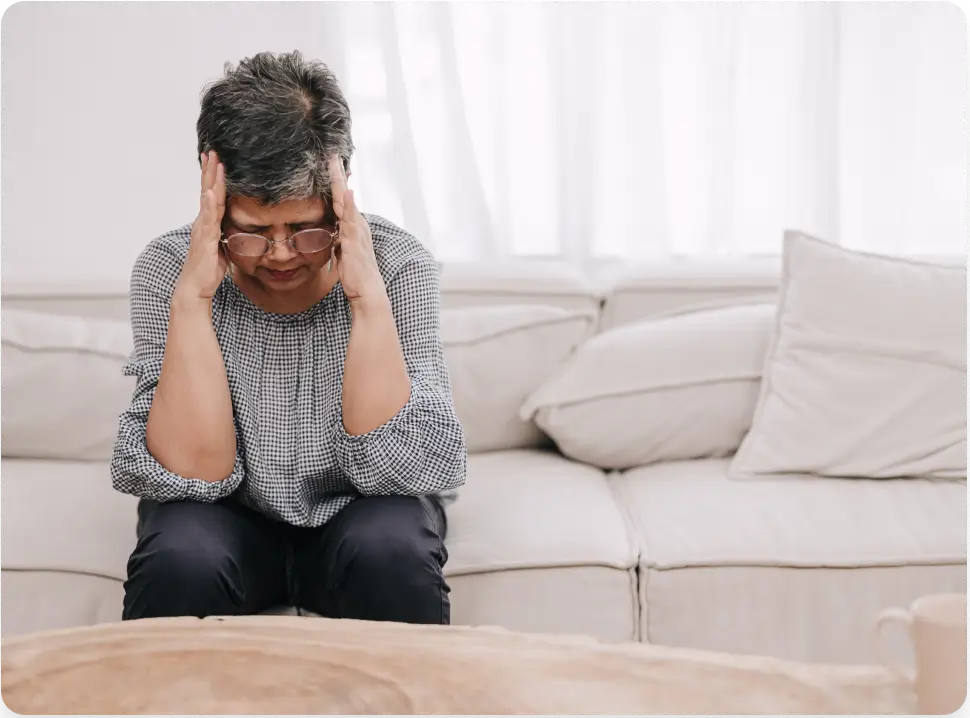


Anxiety Types Quiz: Discover Your Specific Anxiety Type
Do you often feel anxious but struggle to understand why?
Do you ever ask yourself, “Do I have anxiety?” Our comprehensive Anxiety Types Quiz is here to help you identify which of the 7 types of anxiety you might be experiencing. Discover your specific anxiety type and uncover personalized strategies to support your journey toward wellness.

Why The Anxiety Types Quiz Can Be Life-Changing
Anxiety can manifest in different ways, and each type requires a unique approach. This Anxiety Types Quiz is designed to give you personalized insights into your specific anxiety type, whether it's social anxiety, generalized anxiety, or one of the other five types.
Developed by mental health professionals, our quiz uses evidence-based insights to help pinpoint your anxiety type, giving you a clear direction for finding the most effective management strategies without feeling lost in a maze of options.
Knowing your anxiety type can empower you to take control and find the most effective strategies for relief.
What Is Anxiety?
Anxiety is a normal reaction to stress.

Whether it’s the sudden feeling of fear before a big presentation, the knot in your stomach while waiting for important news, or the uneasy hesitation in new situations. Occasional anxiety in stressful situations is natural, even useful, helping us stay sharp and focused when we need it most.
However, when anxiety becomes intense, persistent, or happens without a clear reason, it can start to affect your daily activities in ways that feel hard to manage.
For some, anxiety is a temporary feeling, surfacing only in specific situations. For others, it’s a constant presence in everyday life.
Anxiety takes many forms—social anxiety, generalized anxiety, or panic disorder—each with its own set of mental and physical symptoms and challenges. Imagine understanding exactly why anxiety affects you the way it does and discovering a clear path forward.
Better Self-Awareness and Acceptance
Identifying your anxiety type can shift your perspective.
Rather than seeing anxiety as a vast, overwhelming problem, you can gain clarity in understanding how it specifically shows up in your life. This awareness helps reduce feelings of shame or frustration, allowing you to approach feelings of anxiety with self-compassion, which can make handling everyday activities feel more manageable.
Improved Coping Skills
Each type of anxiety has unique triggers and responses.
Knowing your type allows you to develop personalized strategies that make a real difference. For instance, someone with generalized anxiety might find relief in journaling, while someone with OCD might benefit from mindfulness techniques to reduce compulsive urges.
Insight into Triggers and Patterns
When you understand your anxiety type, you can recognize what sets off your anxious feelings—whether it’s social interactions, certain fears, or life stressors. Awareness of your mental health condition can help you adjust your environment, reduce exposure to triggers, and respond with greater resilience when anxiety arises.
Unlock the power of self-awareness—take our anxiety types quiz to uncover your unique anxiety type and find personalized strategies that bring lasting relief and confidence.
Understanding Your Anxiety Type
Let’s explore some common types of anxiety disorders that our quiz covers, along with real-life examples to illustrate how they can impact quality of life:
With Generalized Anxiety Disorder, or GAD, worry feels like a constant presence, touching on various aspects of life. When you have GAD, you often feel anxious about health, work, relationships, or everyday matters—sometimes with no clear reason. This relentless anxiety can be hard to control, leaving you feeling tense, drained, and unable to relax. Your mind might frequently cycle through "what-ifs" and worst-case scenarios, making it hard to focus.
Example: Sarah worries about her job performance and her family’s health. Even a delayed text stirs anxiety, making her imagine the worst. The constant worry leaves her exhausted, on edge, and struggling to enjoy life.
Social Anxiety Disorder, or SAD, brings an intense fear of social situations where you feel judged or might feel embarrassed. With social anxiety, you often worry about saying or doing something that could lead to scrutiny or criticism. This type of anxiety disorder can cause you to avoid social gatherings and performance situations, even though you might have much to contribute. After interacting with others, you may replay the event, doubting your every word and action, which can make your anxiety worse.
Example: Mark dreads team meetings, fearing judgment from his colleagues. He keeps quiet, avoids eye contact, and later replays everything he said, questioning his every move.
Panic Disorder involves sudden, intense episodes of excessive fear called panic attacks, often accompanied by physical symptoms like a pounding heart or difficulty breathing. Because of the unpredictability of these attacks, you might start to fear specific places or activities, restricting your life to avoid potential triggers.
Example: Lisa had her first unexpected panic attack in a grocery store, with a racing heart and shortness of breath that felt like a heart attack. Now, she avoids the grocery store and similar places, making her world feel smaller.
OCD involves recurring, unwanted thoughts (obsessions) and repetitive behaviors (compulsions) aimed at alleviating your feelings of severe anxiety. Obsessions might include fears about contamination, harm, or order, while compulsions like hand-washing, checking, or counting feel necessary, even if they disrupt your daily life.
Example: Alex worries constantly about germs. He spends hours washing his hands, anxious that he hasn’t cleaned enough. This ritual exhausts him, yet he can’t break the cycle despite knowing his fears are excessive.
Agoraphobia is the fear of situations where escape may be difficult or help unavailable, often triggered by having a panic attack in public. When you have agoraphobia, you would avoid crowded places, public transit, or even leaving your home, creating a life limited to your comfort zone.
Example: After a traumatic event on a crowded subway, James started avoiding public places. Now, even thinking about leaving home causes excessive anxiety, affecting his social life, career, and relationships.
Separation Anxiety Disorder is a mental disorder that causes intense worry about being apart from your loved one, like a partner or family member. This fear can lead to frequently checking in and needing constant reassurance, which makes separation challenging, even for short periods.
Example: Emily feels anxious every time her partner leaves for work, fearing something terrible might happen. She checks in repeatedly, and if there’s no immediate response, she panics. This habit strains their relationship and makes it hard for her to focus on her own life.
Phobias are extreme fears of specific objects or situations, like flying, heights, or certain animals. When you have phobias, you may go out of their way to avoid triggers, which can interfere with your life and limit your enjoyment of new experiences.
Example: Jenna has a severe fear of heights. She avoids tall buildings and has missed out on vacations that involve heights. Her persistent fear has held her back from both career opportunities and social activities she’d otherwise love.
Take the first step toward lasting relief—our anxiety types quiz can uncover the hidden sources of your anxiety and help you find personalized insights to transform your daily life.

Find Your Unique Path to Relief—Take the Anxiety Quiz Now
Take our free anxiety quiz to uncover where you fall on the anxiety spectrum. Through a series of thoughtfully designed questions, the quiz highlights patterns in your thoughts, behaviors, and reactions, helping you identify which type of anxiety aligns most closely with your experience.
Understanding your anxiety type can be transformative.
This insight reveals why you feel the way you do, empowering you to choose anxiety therapy and treatment options that can effectively reduce anxiety’s impact. Start breaking down the mystery of your anxiety today and take the first step toward a tailored path to relief.
Along with your quiz results, you’ll gain access to our expert-crafted mental health and wellness newsletter—filled with actionable tips, insights, and strategies to guide you toward lasting calm and balance.
Uncover your unique anxiety type through our quiz and start your journey to lasting relief and calm.

Start Your Journey: Discover Your Anxiety Type
Ready to discover your anxiety type?